„If ever our utopia of peace in the Middle East were accomplished, Orphaned Land would stop making music“ – Interview with Kobi Farhi
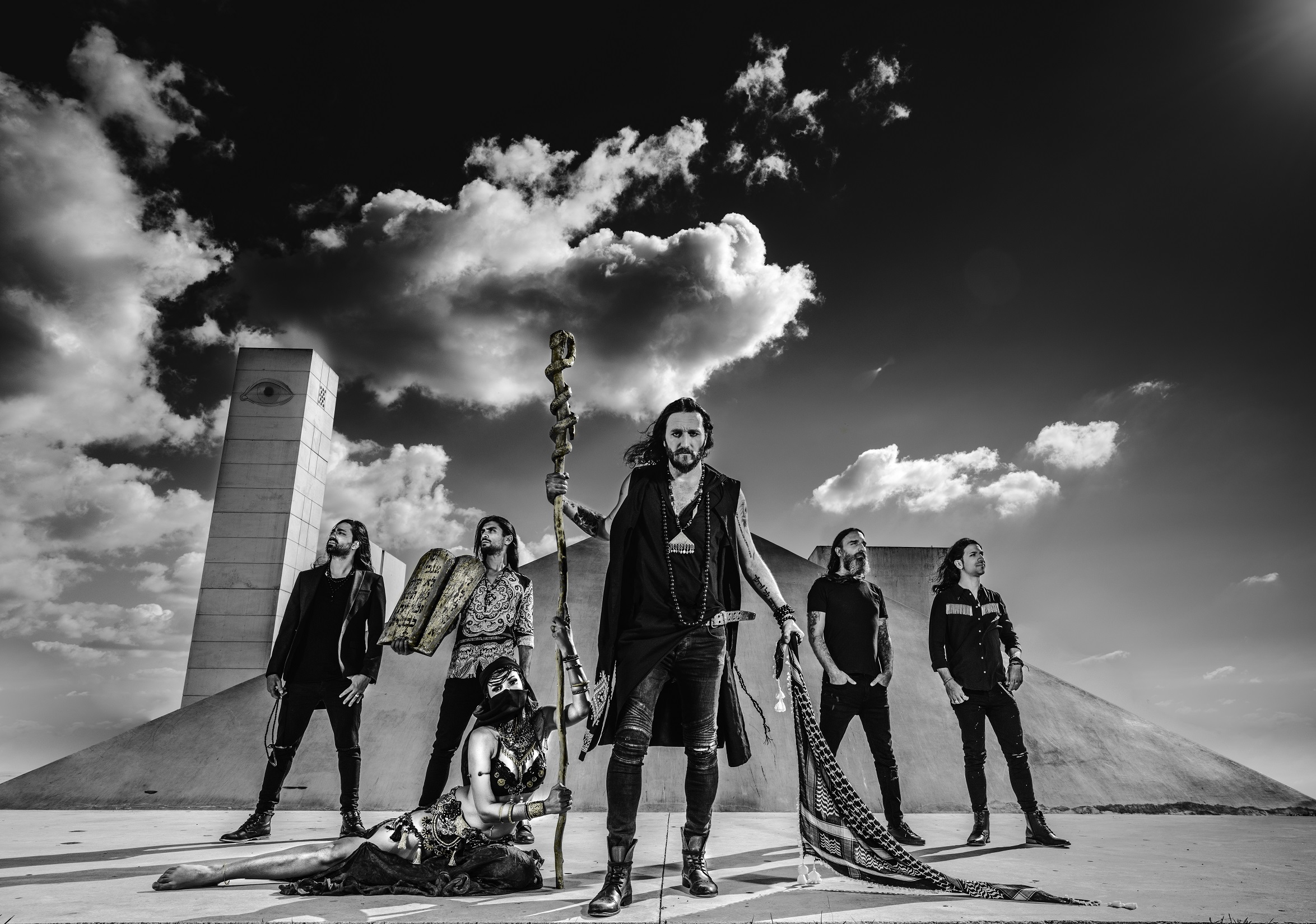
Interview with Kobi Farhi from Orphaned Land at Damask Metal Fest Barcelona 15th – 16th of November 2019
Kobi Farhi, vocalist and mastermind of Orphaned Land, took his time to meet me behind the scenes of Damask Metal Fest in Barcelona on Saturday, 16th of November. The second edition of the festival has grown to a two day long line up, featuring two bands from Israel, Melechesh (Interview with Ashmedi from Melechesh here) and Orphaned Land, but also Finntroll, who were headlining the first evening, then Primordial, Stravaganzza, Embersland, Nightrage and Lacrimas Profundere. It has been a colorful bag of very different yet matching bands that attracted a nice and enthusiastic audience. Also, there are less pleasant places than sunny and warm Barcelona in the middle of November! In this enjoyable context, Kobi and I lost time and space in a very profound discussion about the importance of education, the power of music to change the world and his hope for peace in the Middle East for which Orphaned Land are actively engaged. „All governments of the Middle East suck“ – he told the people during the show – „Actually, all governments all over the world, they suck. We, the people have the power.“ and the mostly Catalonian but also French and some German and a few Argentinean fans exploded in cheers. Orphaned Land are indeed bringing people together from all corners of the world, due to the messages in their songs. But also due to the diverse music, the combination of different kinds of cultures, especially mixing metal with oriental musical elements. No wonder Orphaned Land are greatly getting along with the guys from Amorphis, of whom they are big fans. They even work together for their albums, which Kobi also explained in this interview. Being a new father, though, Kobi’s main concern is how children grow up in this world and how his band, as musicians can influence societies to the better. Find out more below!
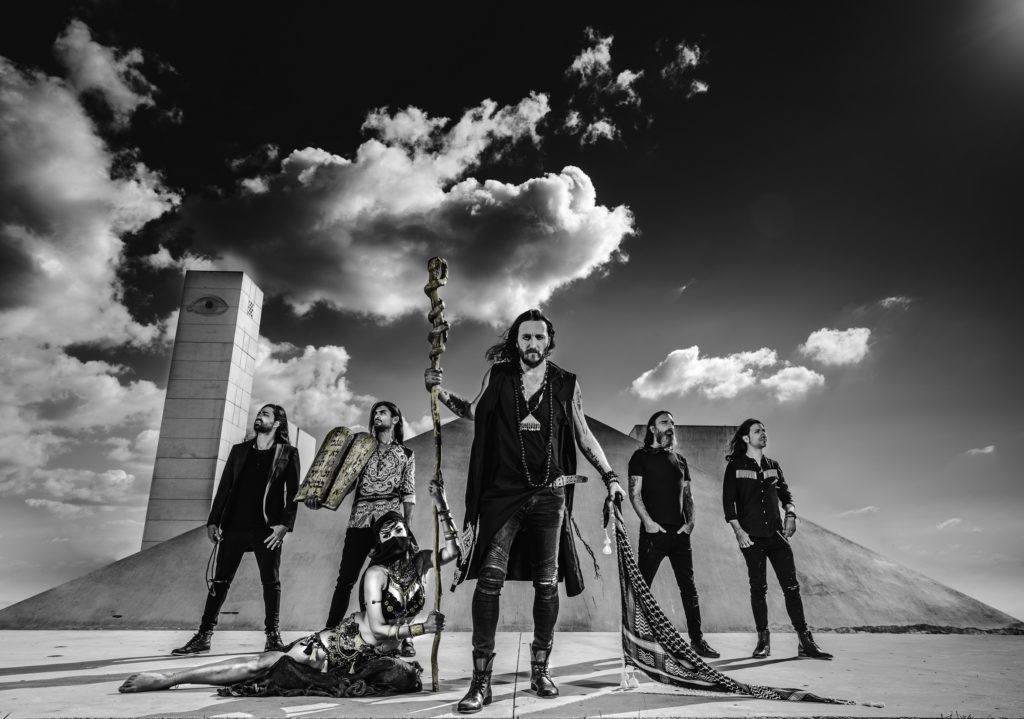
Jasmin: Thank you for agreeing to do the interview! The last time I’ve seen Orphaned Land, it’s been in Lyon.
Kobi: Lyon! What a great concert!
Jasmin: Yeah, it’s been amazing! For me it’s been the first time that I’ve seen you guys live.
Kobi: Like this year, in Lyon?
Jasmin: Yes!
Kobi: Where I made everyone sing for my daughter Leila!
Jasmin: It’s been one of the best moments.
Kobi: Leila… I miss her so much! Look at her picture! Look at her small legs!
Jasmin: And her little toes!
Kobi: I could eat her! She is food for my soul!
Jasmin: Look, I’ve got a present for her.
Kobi: Oh thank you! I am so curious what it is! But maybe I bring it back home and let Leila open it… Thank you!
Jasmin: Then I have a little present for you too …
Kobi: Thank you, I really appreciate this. You’re very kind!
Jasmin: No, you are kind, taking your time! It’s sad that I can’t film your reaction now!
Kobi: [starts unwrapping the gift, laughs out loud] So it’s your dog! I remember that photo! That’s so cute! [still laughing] Thank you so much.
Jasmin: My dog really is a fan of your music, she loves to just chill, sometimes, during the longer songs, she falls asleep and dreams to the music.
Kobi: I love dogs! I don’t have one, because I tour a lot. But I have a cat. I really loved dogs as a kid, because they have a heart.
Jasmin: What I love most about dogs is how social they are. They have such diverse relationships with the humans they know.
Kobi: They are like humans! We call dogs in Hebrew כלב, it also could be interpreted with „like the heart“. „Dog“ equals „like a heart“, this is how we say in Hebrew.
Jasmin: That’s beautiful! Dogs are lovely and less violent than humans.
Kobi: Yes and they really are showing their emotions. Thank you again for the picture!
Jasmin: My dog would love your baby, if ever she meets her, she would just snuggle up to her.
Kobi: One day they will meet! Now Leila is eight months old and I can’t wait to have her on stage with me one day. Maybe when she will be three years old … In Israel, at the end of our shows, there are many kids on the stage. The parents bring their kids, sometimes the kids bring their parents to our concerts and at the end of our Hanukkah shows, I invite all the children to come join us. Then we have about thirty kids on stage and they jump with us to the song “Norra el Norra”. That is why I can’t wait to have my Leila with me!
Jasmin: Maybe you can bring her already as a baby, with an ear protection?
Kobi: That’s too early! She might freak out from the people. When she is two or three and can speak, I will try.

Jasmin: I actually would like to ask you something about the kids! You said already in earlier interviews that education is the key for peace. As Orphaned Land already do a lot with kids, on stage, for example, I am sure you inspire them a lot.
Kobi: I try to educate them. I also give master classes. I am convinced that education is the key.
Jasmin: For the younger, have you ever thought about doing some kind of school education project with music?
Kobi: We just started the Music School of Orphaned Land in Tel Aviv! Yes, I will do as much as I can in terms of education, but I will forever be like Don Quijote, unless the governments won’t change the whole education systems everywhere, because it’s really bad everywhere. They teach things that are not useful. At my school, they taught me trigonometry, what the hell do I need that for? I mean, it’s okay, maybe it helps develop my brain, mathematics is good, but I don’t have use for it. Simple things, like, why did I learn twelve years of mathematics?! I mean, why didn’t I learn about human behavior?! Why didn’t I learn about how to breathe, how to be aware of myself? The differences between men and women, how they think, the anatomy? How to be a gentleman, how to be polite? How to behave? All of these things? How to have a good dialogue? How to listen to people? How to have sympathy? You know, about communication! Why did I learn about trigonometry, about nationality? These are so many things I don’t need. So the school system is basically made by the governments and the governments want us to learn and to educate ourselves. But they don’t want us to ask too many questions and to know too much. Ignorance is what we get from that and this is why we are consuming, reality TV and things like that. We consume everything! If everyone was more educated, we would consume less. We would see that consumption is bad. It’s all about education! I think, you can even teach people that killing other people is forbidden. You can educate them this! I don’t understand how people can kill each other. It would help so much if you take for example toy guns out of rising children, if you stop giving toy guns to the boys and let them do other activities like … don’t know, yoga, maybe?
Jasmin: The toy for your child is not a gun, be sure!
Kobi: I trust you that it’s not a gun. And people usually buy toy weapons for boys. The girls don’t play with weapons, it’s something that boys do. I would leave toy guns out of parenting, out of rising boys.
Jasmin: I agree, it is part of the role model, raising the boys according to the image of the male warrior. This gets reproduced again and again and I doubt that it is a character trait that is in the soul of all boys. There are sensitive boys, too!
Kobi: Yes, I am a sensitive boy! I mean, I live in a war zone and yet I am a sensitive person. Human beings are sensitive. People, soldiers, who come back from the combat, they are always mentally hurt, because everybody is sensitive inside. We are humans! We are not supposed to see people explode or to be on a battlefield!
Jasmin: It should not be normal. It is against human nature!
Kobi: I agree, it is not normal! I think it is engraved deep down in our souls that we know that war is avoidable. Yet, throughout history, men have killed each other, the Vikings, the Portuguese, the Arabs, the Israelis, the Germans, it could be anyone. People are killing each other all the time, there is something fucked up in mankind. But education can change it.
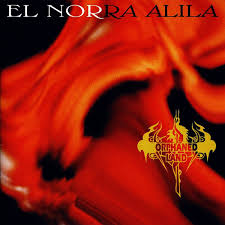
Jasmin: I feel like all kinds of arts, especially music, can help people connect and to see the other as human beings. Maybe arts can help mankind to become more ethical? What do you think about some kind of musical education? For kids?
Kobi: Yes, we do it already! First of all, you really need to come one time to one of our Hanukkah shows. It is usually in December for the Jewish holiday of Hanukkah. You see all of the kids on stage and this is the result of their parents educating them. These kids will carry this on to the children they know. Then we started, as I mentioned, the Music School of Orphaned Land where we teach the youth about music and also about how to think out of the box. Orphaned Land is more than music, so we want to teach all of these things. I do workshops about the story of Orphaned Land and how I succeeded with the band and what we succeeded to do, even if it is a job that doesn’t make a lot of money. We achieved so many things that many people in Israel never achieved, like we helped people to get into a dialogue who normally are enemies. We reached out to fans from countries that are supposed to be our enemies. This is not the kind of hatred you have in football, like Dortmund against Bayern München. The hatred I talk is about humans killing each other. So this is why I do lectures about how we achieved a real dialogue.
Jasmin: In my opinion, all of these competitions of nations against nations is already, on a low level, creating the rejection of the other. It brings people to focus on the differences and to come to the conclusion that „we“ are better than the „others“.
Kobi: Yes, it is the biggest problem! One time, I had a discussion with a friend. We were arguing, if human nature is bad as such, or not. Scientifically, it is not proven that we are bad from inside. My friend then said, looking on the history of mankind, everything ended in the bad way, which means it is part of our natural behavior. Then he corrected himself, that he doesn’t remember if he’d ever met an asshole from … Tibet, for example. In Tibet, people are educated to be tolerant, to have compassion, to be peaceful and to meditate. Maybe you would find an asshole from Tibet, if you look closely, but the statistics of assholes, sorry for using this word, the statistics of crime show something else. If for example children are born in the context of ISIS and you bring these babies to Tibet, they will grow up like the people in Tibet. They would be educated from the first moment according to Tibetan moral. If you bring a baby from there to ISIS and educate them according their shitty agenda, this child from Tibet would grow up like ISIS wants it to be. So this is why education is important.
Jasmin: What you say is so important and touching me, especially about humans not being born bad. You know, I am German and with our past it is sometimes not easy to live with this.
Kobi: Yeah, you carry the burden of the guilt of your grandparents‘ generation. But I think that everyone could become as bad as the Nazis. Also Germany got much more international reaction, I think that Stalin was equally evil as Hitler. He killed more than 20 million of people, of his own people.
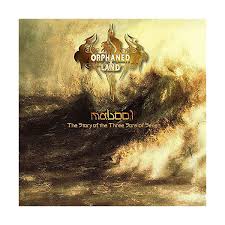
Jasmin: It is in fact a problem that people have the potential to become completely pure and good, yet everyone could turn evil in a certain situation.
Kobi: You know what gives me hope? Germans and Israelis. I mean, the grandparents of my people and of your people had a horrible past, and yet, today, you can see Germans and Israelis smoke weed together, or have sex, or they go to concerts. We have come so far, if you look back to this terrible past! Now we can fall in love with each other, we are okay, we can do everything together. I see this as a prove that everything is possible in the good way, that there is hope for all the other problems we deal with.
Jasmin: That needs a lot of effort, for example through education. It needs the effort to really engage into bringing peace and reuniting people and that was what impressed me most at your shows. Especially the one in Lyon, you came at a very troubled time, when the demonstrations in the French cities escalated. There had been a lot of violence on both sides and the government even sent the anti terror units of the army to back up the police. Imagine this, soldiers against the own people!
Kobi: We are living in Israel. So, these stories of armies, police, chaos, terror, it is part of my life. We have rockets falling on our heads and ever since I was a kid – I grew up in a very mixed city, together with Arabs and Jews – I always had been influenced about how people can get along. But there had always been this reality of terror attacks and wars, people who say they hate me. There are always these two sides. I mean, having been in Lyon, in a chaotic time, now here in Barcelona with the demonstrations for independence, just means that I am in my natural habitat.
Jasmin: It is not normal for central Europe though and it should not be normal in Israel either.
Kobi: Someone in New Zealand would be surprised…
Jasmin: In Germany, we don’t have soldiers in the streets… And in France they even sent the anti terror units into the demonstrations of normal citizens. And then, in the evening, at the Orphaned Land show, to see people from backgrounds where they would normally hate each other, enjoyed your music in peace. You just unite them with your music! It’s like a peaceful bubble. Out there, there is so much separation between the people from different cultures and religions in France, so much hatred.
Kobi: The Jews are not safe there, it is a sad story what is happening in France. It is the failure of the government, they fail to protect them, because the French government insists that everyone is French. Yet, they are still Jews. There was this journalist who did a test. He put the kippah on his head. Actually, he is a christian journalist and he wanted to see what happens if he walks in the streets with the kippah on his head. He filmed his experience and he met so much stupidity! There are still so many stereotypes. Stereotypes like the Germans are Nazis, Jews are in power and Arabs are terrorists, Afro-Americans are monkeys – this is all a chain of stupidity! Unfortunately, the stupid people win all the time. There are so many stupid people and I don’t want to sound arrogant, but stupidity is there because of lack of education. I am not better then the others, I am just asking more questions, I am educating myself, all the time. I try to develop all the time, I write about it, I observe, I ask. Usually, people don’t question anything, they listen to the imam, the priest, they have the newspaper, their leader, to tell them what to do and they are like sheeps! They go where they are told to go and don’t ask questions!
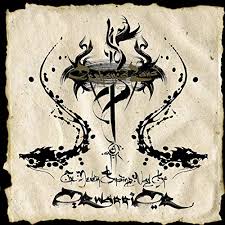
Jasmin: Probably this is why music is so essential. Music is emotional and you can’t hate music if it really touches you and you can’t ignore music.
Kobi: I agree, it goes to your heart before it goes to your brain. You feel the music before you think about it and then it is already part of yourself.
Jasmin: It must be part of the Orphaned Land magic! For example, you sing in so many different languages and although it is nice to understand what you are saying, it is not necessary, because you transport the meaning through the music as well. As listeners, we understand what you want to express through the music.
Kobi: Yes, I think that Israel is a very special country, a melting pot of so many countries. The Jews who came to Israel are from so many different home countries, Russia, Ethiopia, Germany, from more than 80 different places! Imagine the food, the languages, the mentalities! The only thing in common is Judaism. The rest is completely different. If you see our band members, the grandparents from Matan Shmuely are Kurdish and Tunisian, Chen Balbus’ family is Algerian and Polish and mine is from the Balkan. We are all Jews and Israelis, but it is a melting pot. That’s what makes it very special, because it is like … a salad. … I don’t remember why I said this … From this salad, it is a great way to understand the whole world and see the differences and see how it mixes. When you look at it, when you come to Israel, you see it is a very tough country, believe me. But it is also a very interesting and inspiring place to live. Of course, to see the history and monuments, but also experience the melting pot. Israel is very interesting and you get to understand many things if you begin to question things.

Jasmin: You said in the beginning that you don’t know why Orphaned Land is now getting more attention, but I think it is exactly what you said, the melting pot. Also, of course, don’t be offended, please, but from the European, Northern, perspective, it also is the „exotic“. You often see it mentioned in articles about Orphaned Land that they always emphasize the exotic part of the music and the band. This is a little bit weird, as the cultures from the Middle East have always been part of the European cultures as well, throughout the history.
Kobi: They don’t know how to put it in a box. They don’t really understand what is a melting pot. When Jews are living in New York, the image of Jews for the Americans is very specific. It’s the kind of people who immigrated to Brooklyn. They think, this is „the Jews“ and they don’t know that there are at least 80 different kinds of Jews, you need to dig deeper to understand it. So it is usually due to the lack of education. You need to educate yourself, like for example, when I listen to Greek music, I read about it. I don’t only listen to the music, I get information about the times, the current situation, the people, what did they write and sing about and why? This is very interesting! And when I sit with Greek people, I can talk with them about their culture! Sometimes I get the reaction, how the fuck do you know about these things?! I wish everyone would educate themselves! Knowledge is the greatest weapon! Wisdom is the sexiest attribute! I want to be a real partner in a conversation! Of course, I can’t know everything and there are things I don’t know, but I always want to learn more. So sometimes the image people have from others are so fucked up. There are people with ugly opinions about Muslims and they don’t know anything about them. They know a little bit from the newspapers and the politicians – but have they ever spoken to a Muslim? Or studied the Islam? Maybe no! Are there problems in Islam, sure, but there are also great, magnificent aspects about Islam. Of course there are problems, but look at Christianity. Today, it is a nice religion, but they had the Inquisition in the past, and Crusades, the whole of South-America is now christian, because of the Spanish and the Portuguese.
Jasmin: And not in the nice way.
Kobi: No! People lost their cultures! They got slaughtered! Study, all the time. If you want to have an opinion on something, please study. I always appreciate different opinions than mine if these are based on education. If it is not stupid, then it is interesting to discuss. That is why I study, for I can discuss, and then I go home and think about what was said for days.
Jasmin: Yes, you only grow through opposition!
Kobi: To come back to a previous subject. I would even educate the Germans to not forget the Nazi past, but to stop feel responsible. The Germans living now haven’t committed the crimes in the past. I think, that if people insist on Germans being responsible, this will only cause more negative feelings and that is dangerous. We need to remember what happened, but we have to make clear it had not been the people of today. It is very important for me as Israeli to say that I don’t blame the Germans of our time!
Jasmin: It is indeed a sensitive subject.
Kobi: See, we play in Germany, our record label is in Germany. We have many friends there, like I said, it is great story of overcoming the past!
Jasmin: And Orphaned Land is part of changing the past to a better present, reuniting people in the Middle East and beyond!
Kobi: This is my dream, that in Israel, one day, the Jews and the Arabs can be like the Israelis and the Germans.
Jasmin: So, tell me, Kobi. If one day, this utopian idea of yours, is accomplished, what would Orphaned Land then sing about?!
Kobi: We will finish the band.
Jasmin: No!
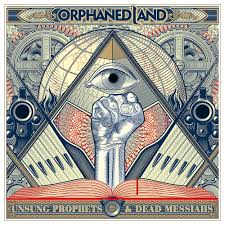
Kobi: [laughs] You know, I had a theory in the past. Did you hear about the theory of the parallel universes? When I was younger, I was sure there were many parallel universes and that this one, ours, it is just a beta version of this fucked up universe, with many bugs and errors and nobody comes to fix it. This is how I felt about this world, because children are dying, people are dying, from Holocaust, whatever. Mankind doesn’t learn from history, the Bible starts with murder. Then, I thought that maybe this world is not fixed, like an old laptop. Somebody put it there and it is not working, but nobody is fixing it. This is how I felt and then I thought, if the world is better – what the fuck will be the music of this world?! Art is about what is hurting you, what you feel, I mean you write about your pain and what bothers you. If everything is okay, what will I write? Reggae? No, I know they treat many problems in Reggae, too, it’s been a bad joke. What I mean is that, I prefer of course a world where no children are killed anymore in change of accepting shitty music. But this destroyed my theory, because I never will get to know a better world. We have to fix this one and we are the ones who can fix it. We are doing something to make it better in our shows! You see in our shows Jews and Arabs together, like in Berlin, or in Turkey, there, we have been the only Jews in the room. The audience was from Saudi Arabia, Syria, Turkey of course, and we were the only Jews. So, when you see that a moment like this exists, you understand it is out there, in the heart of people, it’s there! It exists! It is a sparkle, a flame and you know then that there is hope. In these moments, I don’t feel like Don Quijote. Yet, this is one moment and the rest of the time, you hear about the chaos and you feel like Don Quijote. But I still hold dear to these memories, because it is something important and I know that maybe one day in 300 years, someone will teach at school about this moment when we united people in the audience. So maybe it will become part of the program and I hope that not because I want credits for my band, but for the idea that could be part of what we can give people. To make them think about the possibility to discuss when there is conflict and that you can check the background story, for your own sake, to be more educated. When you know the background, you are a bigger, more beautiful person. This is what should be educated. They need to learn to think and maybe one day it will happen.
Jasmin: Hopefully! There is a spark that people will take from your concerts, listening to your music.
Kobi: We will be part of the change!
Jasmin: I was wondering, coming back to the languages, if you have this vision to undo the Babylonian Confusion?
Kobi: I think it is beautiful to have many languages! The Bible says that God confused mankind, but in my opinion, it is also something beautiful. Otherwise we would not be different! I mean, the great and fascinating thing is that you and me, we come from different backgrounds and we can have interesting discussions about how we grew up. It is so interesting to have this difference! If we had the same experiences, similar past, if we would speak the same language, it would be not as mind opening. See, you have special ways to say things in French, or German, or Arabic, and languages are fascinating for me. They are one of the gifts! The Babylon Tower is a good story, but I think the languages are a gift, not a curse. I see only confusion in the school system. Also, you want to have friends from diverse cultures and you want to taste the food and listen to the music of other cultures, because it is a more interesting life. You don’t always want to eat tomato, you want to make a salad and put in cucumber, and you might cook it or not, it is like food.
Jasmin: You’re coming back to salad, are you hungry?
Kobi: (laughs) No… But I could eat a salad!
Jasmin: Talking about the salad, the melting pot of Israel, from the European perspective, people tend to not see the diversity and labels put music from Babymetal, Melechesh, Orphaned Land, Myrath, into the same box called „oriental metal“. They even add European bands to this. Is this a problem for you, like a form of cultural appropriation?
Kobi: No, I don’t think it is a problem. It is true that people put things into boxes and label them and I think already the word „oriental“ is tricky. In reference to the Middle East, in this area, there are some aspects of culture and religion that are very similar, for example the story of Moses when his mother put him into a basket on the water, there is the same story in Hinduism. His name there is not Moses and it is not in Egypt, but it is the same story. And this is in India which is so far away and even more East than Israel. Then, there are Sarah and Abraham from the Bible. The Hindu have a God and they call him Brahma. You see? Abraham? Brahma? It is no coincidence, because Brahma’s wife is called Saraswati which is the same like Sarah! They are similar! Still, Hindus are Hindus and Israeli are Israeli, but they are all part of the same salad. So, I don’t care about how you define our music as long as you are have knowledge, that’s all I care about.
Jasmin: One of the most famous European bands which combine metal, Northern subjects and oriental musical elements, are without a doubt Amorphis. Like Amorphis, Orphaned Land worked with Swedish producer Jens Borgren for their last two albums (Amorphis: “Under the Red Cloud”, “Queen of Time”; Orphaned Land “All is One”, “Unsung Prophets & Dead Messiahs”). Together, Jens Bogren and Amorphis, created a suspenseful contrast of Finnish metal and oriental music, making this a bit of “their thing”. Now, that Orphaned Land also work with Jens Bogren, can you tell us a bit more about this cooperation?
Kobi: Amorphis are great friends of ours. We have toured together and spent long periods of time together. I see the similarity in a way between both bands, but the fact is that both bands are here since forever, when you go back to the 90s. I even was a guest on Amorphis‘ show in Tel Aviv, I think there are YouTube videos about this.
I’m not sure who was the first band to work with Jens, but in general he is one of the most wanted producers on the business, because he knows how to do it. Personally, I love working with him, though we fight often in the studio.
Jasmin: On the “Queen of Time” album from Amorphis, there’s the string sections done by “The Orphaned Land Oriental Orchestra”. How involved are Orphaned Land there?
Kobi: Jens Bogren asked me to use our strings section from Turkey for the Amorphis album and I assisted to make it happen.
Jasmin: Do you have any news about new music for Orphaned Land?
Kobi: See, I am a father now and I am full of love. At the moment, I don’t know if what I am feeling would be a subject for Orphaned Land. We are about protest.
Jasmin: Anyway, thank you for letting us peek behind the scenes! And thank you again for your time and this great discussion!
Kobi: Thank you too!
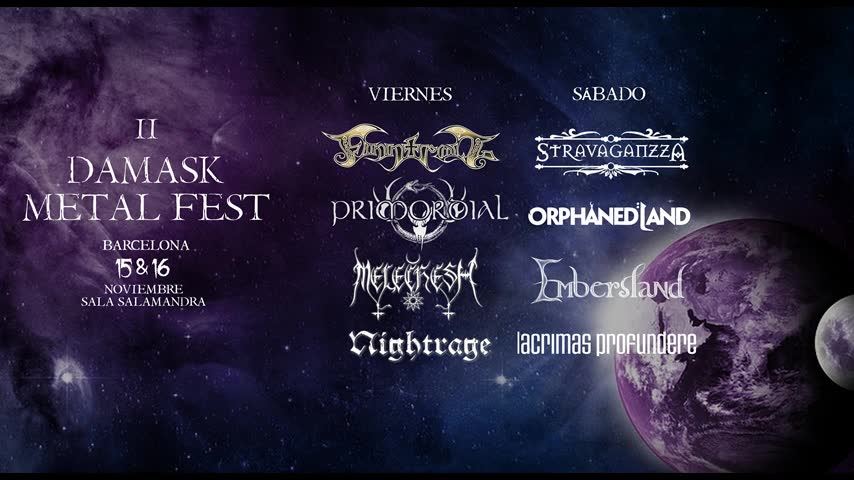

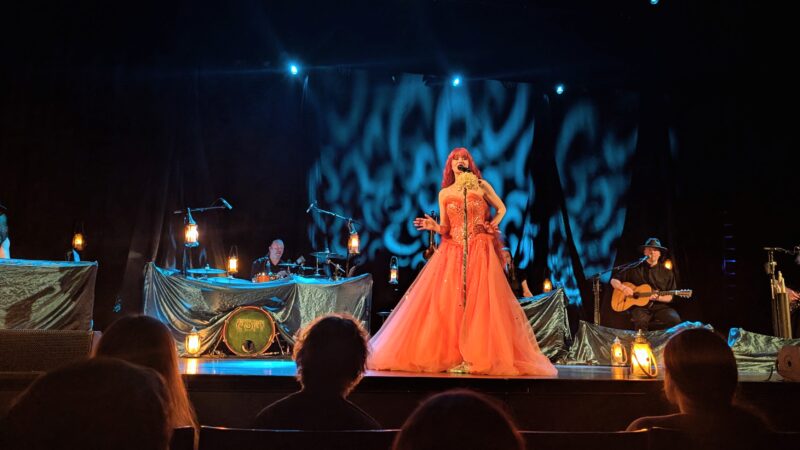


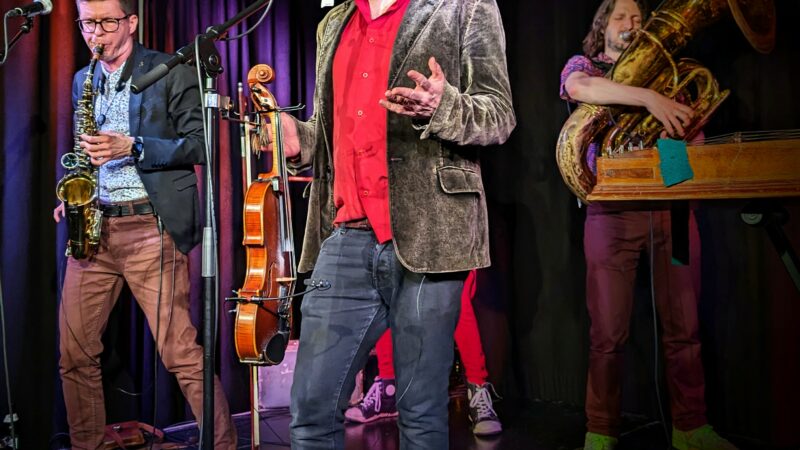

7 thoughts on “„If ever our utopia of peace in the Middle East were accomplished, Orphaned Land would stop making music“ – Interview with Kobi Farhi”